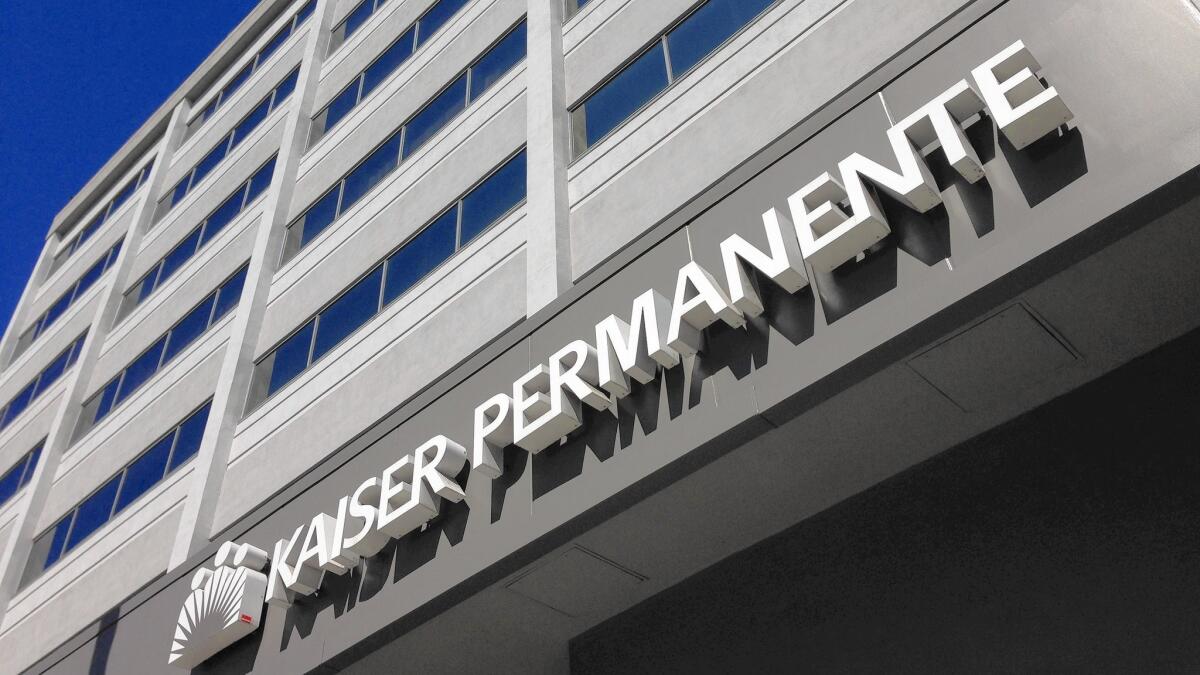A fishy fee ‘adjustment’ from Kaiser

- Share via
Karen Kurokawa was happy to pay her husband’s Kaiser Permanente bill. She just wanted to know why Kaiser had adjusted it almost $2,000 higher.
The fact that the Culver City resident couldn’t get a straight answer from Kaiser, even after she filed a formal grievance, highlights the challenge patients face in knowing their true healthcare costs.
The episode also raises questions about Kaiser’s billing system. Kurokawa said she was told by a senior company executive that “things happened that shouldn’t have happened, and things that should have happened didn’t.”
What things? Should all Kaiser members be watching for hinky charges on their bills? Kaiser isn’t saying.
Rodger Butler, a spokesman for the state Department of Managed Health Care, said investigators have looked into Kurokawa’s case. The agency, he said, is “hesitant” to discuss the matter because of the possibility of “further DMHC action.”
Kurokawa said she just wanted to find out why Kaiser raised their bill. Insurance adjustments, she said, are supposed to lower a patient’s hospital bill.
“I wasn’t looking to get something for nothing,” Kurokawa said. “I was willing to pay whatever we owed. I just wanted to understand what was happening.”
Sandra Hernandez-Millett, a Kaiser spokeswoman, said that “we have apologized for any confusion that may have been created, and I understand that specific matter has been resolved to the satisfaction of the member.”
Not really. “They still haven’t explained a thing,” Kurokawa said.
Her husband underwent a minor procedure last July at Kaiser’s West Los Angeles facility.
A few weeks later, the couple received a bill totaling $5,059, which included Kaiser’s insurance adjustment of $1,989.25.
This is intriguing because Kaiser, as a health maintenance organization, operates both the hospital and the insurance plan. It knows exactly how much a procedure costs and exactly how much will be covered by insurance.
“It’s like they made a mistake and admitted that this procedure cost only $3,800 but the amount they really wanted was $5,000,” Kurokawa said.
A series of Kaiser service reps was unable to explain the discrepancy, she said. Finally, she said, a rep told her that “this is the policy, and we’re allowed to do it.” The rep said Kurokawa’s only recourse was to file a grievance, which she did.
Kaiser subsequently rejected her request that the bill be reduced to the hospital charge of about $3,800.
After I contacted the company last week, however, Kurokawa said she received a call from Bernie Nadel, Kaiser’s director of patient financial services and call center operations in Southern California.
“He apologized for the confusion,” she said. “He said we would receive a credit for the adjustment on our next bill.”
Other than an acknowledgment that “things happened that shouldn’t have happened,” Kurokawa said, Nadel offered no explanation for why her bill was so high.
Hernandez-Millett, the Kaiser spokeswoman, declined to connect me directly with Nadel. She also declined to comment on the remarks Kurokawa attributed to him.
Hernandez-Millett said some Kaiser members may not understand that the “allowed amount” under some plans “is separate and apart from the provider charge master,” which is a price list used by hospitals as a starting point in negotiations with insurers.
Pricing, she said, is based “on a number of variables.”
“For most services, the allowed amount from the HMO fee schedule is less than the provider charges. In some cases, the HMO fee schedule is greater than the provider charges,” she said.
So basically Kaiser is saying that it has two prices for healthcare. Maybe you’ll be charged one, maybe the other.
In reality, it’s not so complicated. The medical charges for Kurokawa’s husband amounted to about $3,800 — without Kaiser’s adjustment. This is how much healthcare he received.
All the insurance gobbledygook in the world can’t disguise the fact that any adjustment north of that amount is an after-the-fact price hike.
Kaiser’s inability to explain its pricing to a patient, to deny a formal grievance and to then apologetically waive the extra fee only after media scrutiny indicates a billing process that is highly problematic.
If nothing else, it makes it appear that Kaiser’s fees are arbitrary and that all members would be wise to question their bills.
Kurokawa said she and her husband are grateful that Kaiser got rid of the extra fee and are pleased with the quality of care they’ve received.
“But if this is the way they deal with customers,” she said, “we might have to switch insurance plans.”
David Lazarus’ column runs Tuesdays and Fridays. He also can be seen daily on KTLA-TV Channel 5 and followed on Twitter @Davidlaz. Send your tips or feedback to david.lazarus@latimes.com.
More to Read
Inside the business of entertainment
The Wide Shot brings you news, analysis and insights on everything from streaming wars to production — and what it all means for the future.
You may occasionally receive promotional content from the Los Angeles Times.











